Key takeaways:
- Medical Decision Support enhances healthcare by improving clinician confidence and decision-making through technology.
- Continuous learning is vital for adapting to evolving medical practices and enhancing patient care.
- Engaging with professional communities fosters collaboration, knowledge sharing, and inspires innovative approaches in healthcare.
- Reflective practice, such as maintaining a journal, aids in personal growth and improves clinical decision-making by learning from both successes and failures.

Understanding Medical Decision Support
Medical Decision Support is all about leveraging technology to aid healthcare professionals in making informed decisions. I vividly remember the first time I used a clinical decision support system; it felt like having a seasoned mentor at my side, guiding me through complex patient cases. It raised an intriguing question for me: how can these systems, designed to improve outcomes, be fine-tuned to respect each patient’s unique context?
In my experience, understanding the nuances of Medical Decision Support involves more than just grasping the system’s functionalities; it’s about building trust in the recommendations provided. I often think about the emotions involved when a physician relies on these tools, particularly when facing high-stakes scenarios. Isn’t it fascinating how a well-designed tool can boost confidence in a challenging situation—turning hesitation into decisive action?
Moreover, the integration of these systems into daily practice is a continuously evolving journey. I’ve encountered setbacks, like when new guidelines rolled out and required retraining. It made me reflect on adaptability. How do we, as clinicians, stay ahead of the curve while ensuring that these advancements genuinely enhance patient care? Understanding Medical Decision Support isn’t merely about using the technology; it’s about a collective commitment to improving healthcare quality.
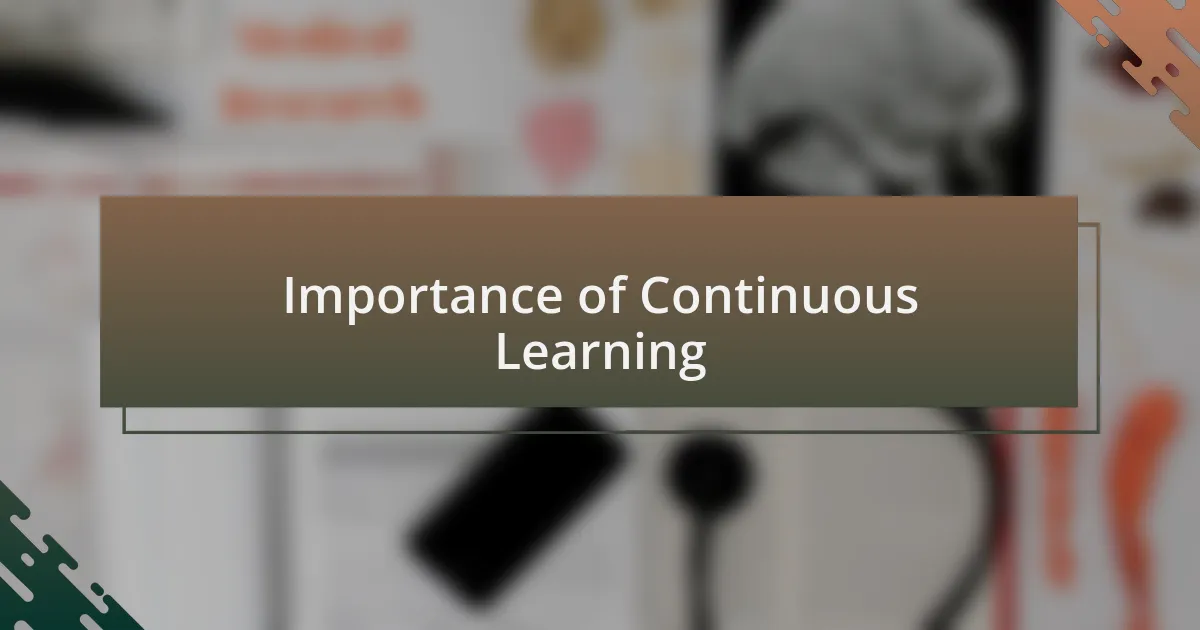
Importance of Continuous Learning
Continuous learning is essential in the ever-changing landscape of healthcare. I remember attending a recent conference where an expert shared groundbreaking research on artificial intelligence in diagnostics. It struck me how quickly our field is evolving and how staying informed can significantly impact patient care. Can we afford to let our knowledge stagnate in a profession that thrives on innovation?
I often think of my initial struggles with new medical guidelines; they felt overwhelming at first. However, diving deeper into the latest developments turned what seemed like a chore into a passion. It’s incredible how embracing continuous learning not only enhances my expertise but also transforms my ability to support patients effectively. What possibilities open up when we view learning as an exciting journey rather than a mere obligation?
The emotional resilience developed through lifelong learning truly resonates with me. There have been tough days when new evidence challenged my previous beliefs. Yet, each time I adapted, I felt a renewed sense of purpose. This ongoing process not only sharpens my skillset but also deepens my connection with patients who depend on my knowledge. How can we not invest in ourselves when our growth directly influences those we serve?
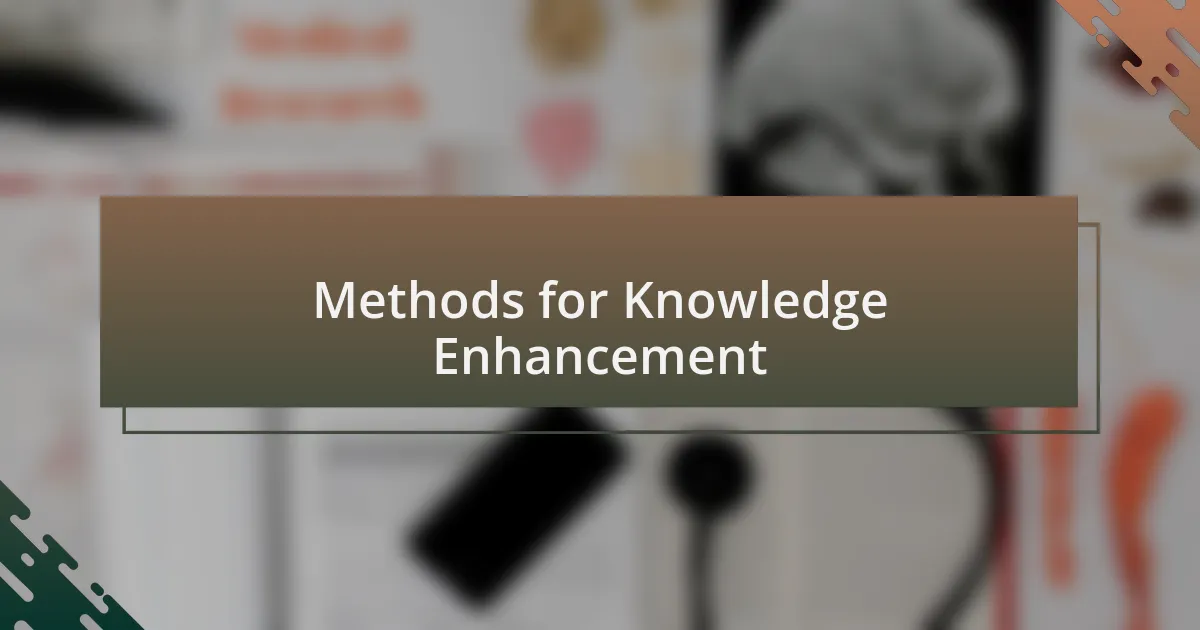
Methods for Knowledge Enhancement
Engaging in regular workshops and seminars has become a cornerstone of my knowledge enhancement strategy. I recall a particularly eye-opening session focused on telemedicine, where I learned practical tools and techniques that I immediately applied in my practice. Isn’t it fascinating how real-time interactions with experts can lead to instant shifts in your perspective?
Reading reputable journals and publications is another method I highly recommend. I make it a point to carve out some quiet time each week to read recent articles. This intentional habit not only keeps me updated but also sparks new ideas on how to approach patient cases more creatively. Have you ever experienced that ‘aha’ moment when a piece of research perfectly aligns with a challenge you are facing? I know I have, and it’s truly rewarding.
Lastly, networking with colleagues within and beyond my specialty has proven invaluable. Whether it’s a casual lunch or a formal discussion group, sharing insights allows us to learn from one another’s experiences. I remember a discussion about integrating psychological aspects into patient care that opened my eyes to a broader approach. How often do we overlook the wealth of knowledge right in front of us? Building these connections continually enriches my understanding, reminding me that we’re all on the same journey of growth.
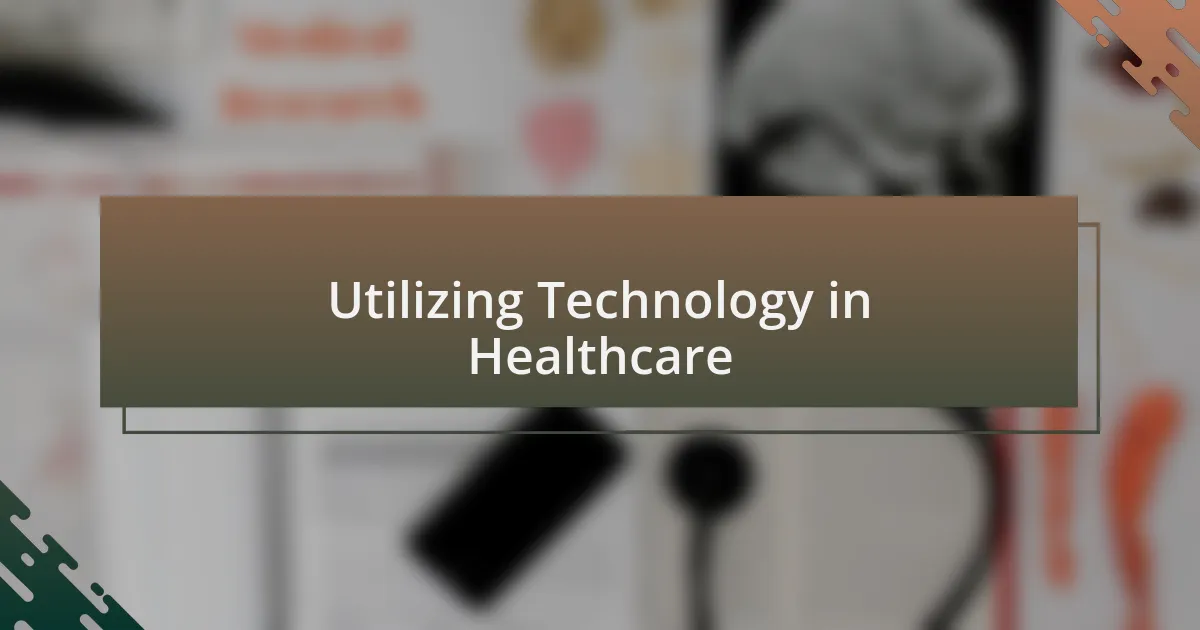
Utilizing Technology in Healthcare
Utilizing Technology in Healthcare
In today’s healthcare landscape, technology plays a pivotal role in enhancing patient outcomes. I vividly remember introducing an electronic health record (EHR) system in my practice, which not only streamlined patient information but also significantly reduced errors. Have you ever felt overwhelmed by handwritten notes? Switching to EHR made me realize how much clearer everything became when data was efficiently organized.
Telehealth services are another fascinating technology that I’ve embraced wholeheartedly. Just last month, I conducted a follow-up consultation via video call. It was staggering to see how comfortable my patient felt discussing sensitive topics from the comfort of their home. How many opportunities does this create for patients who may have previously felt isolated or reluctant to seek care?
Artificial intelligence is now at the forefront of assisting healthcare professionals in making informed decisions. I’ve experimented with several AI-based diagnostic tools, and the insights they provide are incredibly valuable. Isn’t it exhilarating to think about how these technologies could help us catch conditions earlier than ever before? Embracing these advancements not only empowers my practice but also deepens my commitment to providing the best possible care.
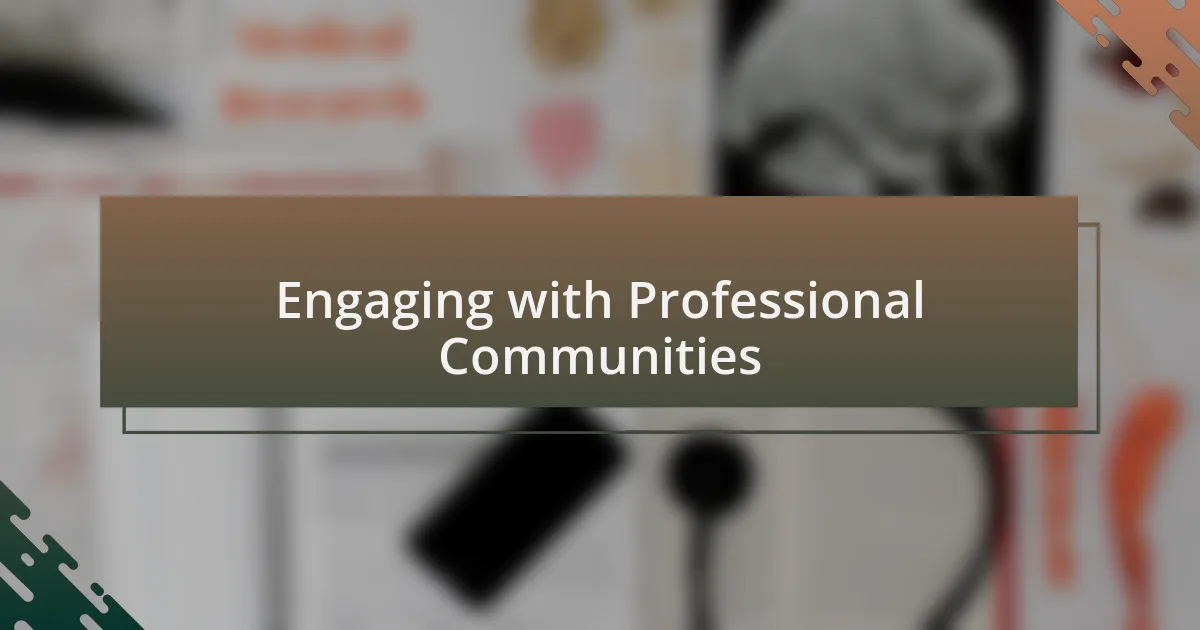
Engaging with Professional Communities
Engaging with professional communities has been an eye-opening experience for me. I regularly participate in online forums where healthcare professionals discuss emerging trends and share valuable insights. Just the other day, I read a post where a fellow clinician outlined a recent case study involving decision support systems. It got me thinking, how often do we really leverage collective wisdom to tackle our daily challenges?
I also find attending conferences immensely rewarding. At a recent gathering, I had the chance to engage with leaders in medical decision support technology. Listening to their presentations, filled with passion and innovation, inspired me to explore new avenues in my practice. Have you ever noticed how an inspiring talk can reignite your motivation?
Networking within these communities has led to collaborative research opportunities, which I genuinely cherish. I remember co-authoring a paper with a colleague I met at a workshop. The exchange of ideas not only broadened my perspective but also affirmed my commitment to continuous learning. Isn’t it fascinating how meaningful connections can propel our expertise forward?
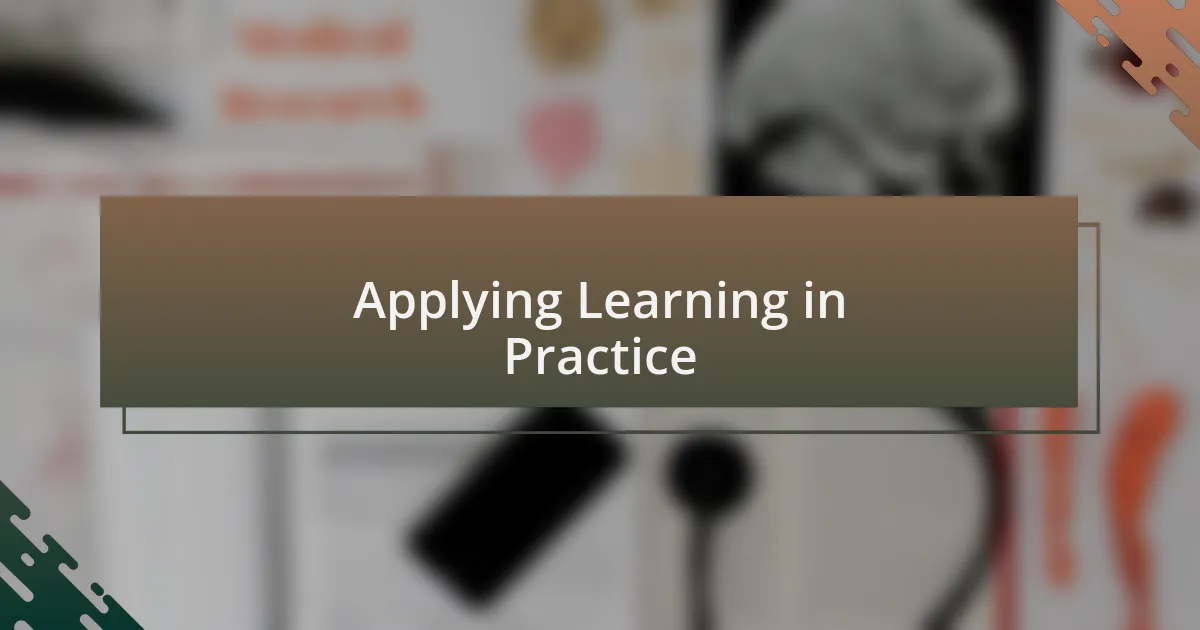
Applying Learning in Practice
Applying learning in practice is where theory transforms into tangible outcomes. Recently, I implemented a new decision support tool after thoroughly assessing its features through ongoing training. The first time I utilized it in a patient consultation, I was both nervous and excited. The positive outcome reinforced my belief that integrating learning directly into my work can significantly enhance patient care.
It’s interesting how practical application allows me to test theories in real-time. I recall a situation where I revised my approach to managing a complex case based on insights from a recent webinar. By applying what I learned, I was able to make a more informed decision that ultimately improved the patient’s treatment plan. Have you ever had an experience where a new idea dramatically changed your approach to a challenge?
I’ve also discovered that reflecting on my experiences is essential. After applying a novel technique, I take time to analyze what worked and what didn’t. This critical self-reflection not only reinforces my learning but helps me to adapt and refine my skills. Don’t you think that understanding our missteps is just as valuable as celebrating our successes?
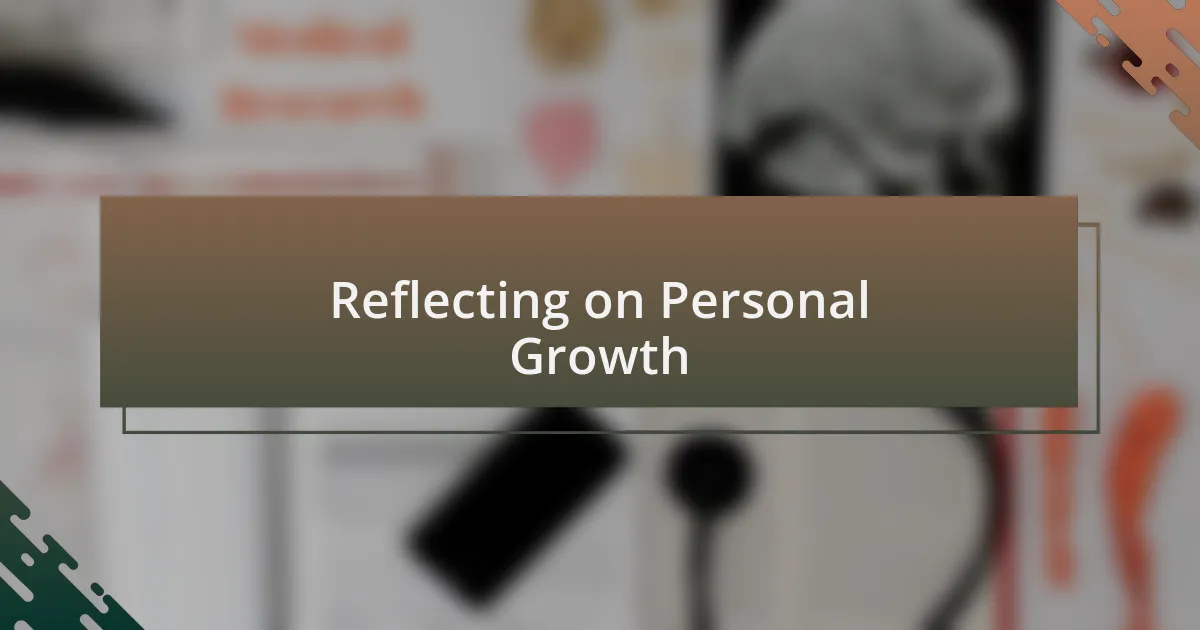
Reflecting on Personal Growth
Reflecting on my journey of personal growth has become a vital part of my daily routine. I often find myself pausing after a challenging day, sifting through the experiences and evaluating my decisions. It’s surprising how much clarity can emerge when I allow myself to feel the weight of my choices—successes and failures alike.
One memorable instance comes to mind when I miscalculated the potential impact of a recommended treatment. I spent days afterward replaying the scenario, feeling a mix of frustration and determination. It was during this reflection that I realized how crucial it is to embrace mistakes as stepping stones rather than setbacks. Have you ever felt the urge to avoid looking back at tough moments? I’ve learned that confronting those feelings head-on often leads to the most profound insights.
Now, I prioritize maintaining a reflective journal, where I jot down my thoughts and feelings about various cases. This practice not only captures my growth but also serves as a reminder of my evolving expertise. It’s intriguing how a simple act of writing can spark new ideas and reinforce my commitment to continuous learning. What if more professionals followed this path of reflection? I believe it could lead to a collective rise in our field’s standards.